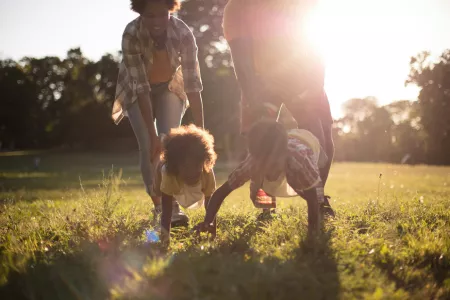How can divorce impact children?
We’re bombarded with headlines about how bad divorce is for children.
In reality, it’s 'bad' separations that can have a negative impact on children, due to two main culprits - parental absence and conflict. It’s not always possible to control these, however, if you’re able to, then this will help your children cope with your separation.
In this blog, I’ll explore why parental absence and conflict are so damaging for children and the benefits of both parents continuing to see their children post-separation.
Having two parents at home often increases the likelihood that the parenting load, financial issues and decision-making are shared which then has a beneficial knock-on effect on stress levels. Divorce can reverse this state. Suddenly the majority of parenting might be down to one person, the family's financial situation can change immeasurably and the bubbling stress and emotions around setting up a new parenting relationship can be overwhelming.
No wonder then, that adding in the factor of parental absence can tip a child into disarray. On the assumption there are no safeguarding issues, not seeing a parent for a few weeks or months while the divorce is being sorted, or losing touch for years, can lead to significant feelings of rejection, loss, grief and confusion for the child.
Anyone who has had to support their child when their child’s best friend has left the school will know the impact of that lost relationship. We work hard as parents to keep the contact going with the friend who has moved away in order to sustain some sort of ongoing relationship. However, when we’re going through a divorce, it can be hard to factor in your child’s need for continuation with both parents because the last person you want to see is your ex. However impossible a partner your ex was, they are still your child’s parent. Again only in the context of no safeguarding concerns, keeping some kind of contact with both parents is a significant buffer to the negative impacts of divorce for a child.
Tip: If physically spending time with your children isn’t possible, texts or video calls can be a good alternative to keeping in touch with them and providing a level of stability and continuity.
Our relationship with our parents changes over our lifetime – like a piece of elastic held between ourselves and our parents it can stretch and compress as we go through different phases of our lives. If, as part of a divorce, a parent leaves the family home and does not have contact with their child, that elastic doesn’t stretch or compress, it just collapses as there’s only one side being held. This loss is devastating to a child and changes the way they think about themselves as well as how they view others. Children cannot be expected to initiate contact with their other parents, we grown-ups have to do that.
The second factor highlighted by research is conflict. No one likes being around arguments, aggression, seething resentment or name-calling. Whether we are kids in a playground or sitting having a drink with friends, witnessing conflict between others creates all sorts of anxiety. Firstly, our self-protective systems kick in, gearing us up to fight or fly. Then we worry about the other people involved. Are they ok? Should I do something to stop this?
Witnessing conflict as a child is believed to create irreversible changes to their neurobiology, impacting how they react to and cope with stress forever more. Containing your anger and resentment towards your ex is something you need to master over the course of your divorce or separation. Your child does not need to be reminded of how much you might dislike one another – after all, there is nothing at all they can do to change that, so it becomes instead, a burden of helplessness. Putting on an Oscar-winning performance with your ex is one of the greatest gifts you can give your child during a divorce. Behaving decently and graciously will not only bring your kids’ stress levels down, but it will also help you to feel more in control.
Growing up with two parents at home doesn’t guarantee happiness, and research from the Children’s Commissioner has shown that sometimes separation might be the better option for children where there’s a high level of conflict:
“The impact of parental separation depends on the level of parental conflict. Studies have shown that where parental conflict was high, young adults had better outcomes if their parents separated” - Family Review (2022), Children’s Commissioner
It also highlighted the importance of family relationships in terms of a child’s well-being, rather than family dynamics. So having two happy homes and being able to see both parents often, even if it’s a video call, is better than one unhappy home where there is conflict and family relationships are strained.
Divorce and separation are here to stay. It’s as much a part of our family lives as marriage is and importantly this doesn’t automatically need to have a negative impact on children. However, a ‘bad’ separation where there is parental absence and conflict can have a ripple effect which can impact a child’s life forever.
If you are going through a divorce, chances are you’re stressed, angry, unsure and sad. Managing these emotions while also taking care of your kids is no mean feat and can lead to huge amounts of guilt and self-loathing. Make the most of the research findings out there, resources, tools and professionals to help you get through this. Try as hard as you can to keep in contact with your child and work hard to reduce the conflict that your child sees. These two things will improve the chances of your child getting through the divorce healthily.
You can buy a copy of Dr. Angharad Rudkin's book - 'The Split Survival Kit: 10 steps for coping with your parents’ separation' here.
Read More

The amicable co-parenting app helps you manage all aspects of co-parenting in one secure place, making parenting after divorce and separation simpler.

Choosing the right school for your child is a major decision, and when you’re divorced or separated, reaching an agreement with your ex-partner can feel particularly challenging.

In this episode, Kate was joined by Joe & Kate Sharp, two amicable customers, to share their divorce story.

Co-parenting advice
Speak to a Co-parenting Specialist for help with all aspects of separated parenting.
Book a free 15-minute consultationYour guide to a kinder divorce
What if divorce didn’t have to be a battle?
In amicable divorce, Kate Daly offers compassionate, practical guidance to help you separate in a kinder, better way. Whether you’re just beginning, working through the practicalities or adjusting to co-parenting, this book meets you exactly where you are - and helps you move forward with confidence.
Pre-order on Amazon today
.webp)





Comments (0)